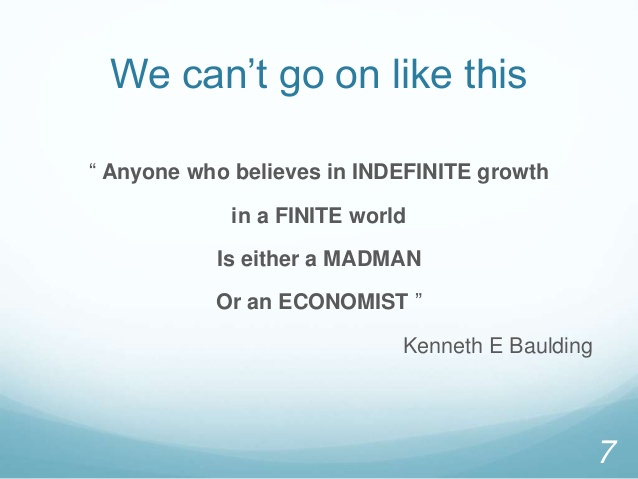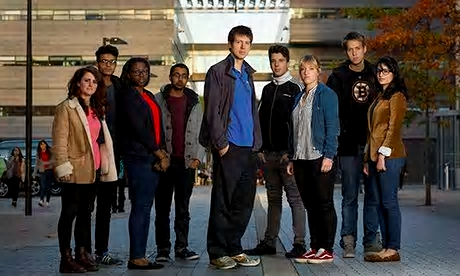- Details
- Written by: Kamran Mofid
- Hits: 5865

Photo:image.slidesharecdn.com
How economic growth has become anti-life
An obsession with growth has eclipsed our concern for sustainability, justice and human dignity. But people are not disposable – the value of life lies outside economic development
By Vandana Shiva

Vandana Shiva is a philosopher, environmental activist and author. She is one of the leaders and board members of the International Forum on Globalisation (Vandana Shiva - Wikipedia, the free encyclopedia)-Photo:cornucopia.org
“Limitless growth is the fantasy of economists, businesses and politicians. It is seen as a measure of progress. As a result, gross domestic product (GDP), which is supposed to measure the wealth of nations, has emerged as both the most powerful number and dominant concept in our times. However, economic growth hides the poverty it creates through the destruction of nature, which in turn leads to communities lacking the capacity to provide for themselves.
The concept of growth was put forward as a measure to mobilise resources during the second world war. GDP is based on creating an artificial and fictitious boundary, assuming that if you produce what you consume, you do not produce. In effect , “growth” measures the conversion of nature into cash, and commons into commodities.
Thus nature’s amazing cycles of renewal of water and nutrients are defined into nonproduction. The peasants of the world,who provide 72% of the food, do not produce; women who farm or do most of the housework do not fit this paradigm of growth either. A living forest does not contribute to growth, but when trees are cut down and sold as timber, we have growth. Healthy societies and communities do not contribute to growth, but disease creates growth through, for example, the sale of patented medicine.
Water available as a commons shared freely and protected by all provides for all. However, it does not create growth. But when Coca-Cola sets up a plant, mines the water and fills plastic bottles with it, the economy grows. But this growth is based on creating poverty – both for nature and local communities. Water extracted beyond nature’s capacity to renew and recharge creates a water famine. Women are forced to walk longer distances looking for drinking water. In the village of Plachimada in Kerala, when the walk for water became 10 kms, local tribal woman Mayilamma said enough is enough. We cannot walk further; the Coca-Cola plant must shut down. The movement that the women started eventually led to the closure of the plant”… Read the full article
Read more:
In Praise of the Economic Students at the Sorbonne: The Class of 2000
Towards an Education Worth Believing In
Small is Beautiful: The Wisdom of E.F. Schumacher
Economics and Economists Engulfed By Crises: What Do We Tell the Students?
- Details
- Written by: Kamran Mofid
- Hits: 13572
Photo: Mohamed Nohassi
I was recently at a conference, where I delivered a paper on spirituality and education, economics, business and management. After the presentation and during the Q&A session, a young lady in the audience asked me a question: “What does Spirituality Mean to You?”
I thought that was a very good question. For years I have been using the term “Spirituality” and relating it to different topics and issues. Now I was put on the spot and I was asked to explain what spirituality means to me. You know, it is not always easy to answer profound questions during the Q&A sessions adequately, when you only get a couple of minutes for each answer!
However, I tried to do my best, given the time constraint. I recall saying things like these:
“Spirituality refers to aspects of human existence beyond material concerns. These aspects lie in an inside world - the soul - and an outside world - the universe. Spiritual beliefs are often grounded in a core concept that unifies all existence and connects all people to each other. People have many names for this concept - God, gods, a Higher Power, Truth, the Absolute, the One, the Ineffable, the Great Mysterious. For me spirituality also means to be grateful and give thanks for all the beauty and mystery of life itself: the sun rise, the sun set, the moon and stars, butterflies dancing in the sky, the morning walk and the birds’ chorus, seeing “A host of golden daffodils; Beside the lake, beneath the trees, Fluttering and dancing in the breeze”, the smile of my wife and love of my children, my friends and the wonders of friendship, my love, commitment and dream of the GCGI.”
I also remember saying that ”Spirituality also involves the search for existential meaning - the questions we ask about the purpose of human existence, to help us all cultivate heart, passion, joy, personal transformation, and renewed devotion. Questions such as:
Who are we? Where have we come from? Where are we going? Why are we here? What happens after we die? Why do we suffer? Why do we die? What is the meaning of life? Is there a God? What is nature? What is religion? What is philosophy? What is knowledge? What is wisdom? What is joy? What is pain? What is happiness? What is life? Am I a good person?...”
Anyhow, the above was the extent of my dialogue, my answer to that very good question: “What does Spirituality Mean to You?”
The conference ended. I packed my bags and headed back home, all the way thinking about the question “What does Spirituality Mean to You?” I also knew that I had to answer that young lady and thus, myself, more fully. So I began to reflect more, to think more about “Spirituality & I”. Below is a brief note on the fruit of that journey and dialogue.
First, there is no doubt that the wisdom of spirituality has become an important issue in everyday life. A lot of articles and academic papers have been published in recent years highlighting the role of this variable in enhancing our lives and well-being, physically and emotionally.
Definition of Spirituality
‘Spirituality offers a worldview that suggests there is more to life than just what people experience on a sensory and physical level. Instead, it suggests that there is something greater that connects all beings to each other and to the universe itself. It also proposes that there is ongoing existence after death and strives to answer questions about the meaning of life, how people are connected to each other, truths about the universe, and other mysteries of human existence.’-"8 Keys to Stress Management"
As noted in different studies, the term ‘spirituality’ means many things to different people. For many people, spirituality means a search for personal meaning and a relation to the Supreme Being that many of us call God. Other definitions include “the unique and personal inner experience of and search for the fullest personal development through participation in the transcendent mystery. The experience and development always involve a sense of belonging to a greater whole, and a sense of longing for a more complete fulfilment through touching the greater mystery, which in many traditions is referred to as God.”
A relatively more understandable opinion on the definition of spirituality is that spirituality is a state or experience that can provide individuals with direction or meaning, or provide feelings of understanding, support, inner wholeness or connectedness. Connectedness can be to themselves, other people, nature, the universe, God, or some other supernatural power.
Besides having many definitions, understanding spirituality becomes more complicated as this term is commonly used interchangeably with the term “religiosity”. However, here, I am only going to discuss spirituality. I will turn to "religiosity" at a later date.
In short, while the definition of spirituality is different for everyone, here are some common themes associated with spirituality which can assist us in formulating what we mean by spirituality:
- The idea of a process or journey of self-discovery and of learning not only who you are, but who you want to be.
- The challenge of reaching beyond your current limits. This can include keeping an open mind, questioning current beliefs, or trying to better understand others' beliefs.
- A connectedness to yourself and to others. Spirituality is personal, but it is also rooted in being connected with others and with the world around you. This connection can facilitate you finding "your place in the world."
- Meaning, purpose, and direction. Spirituality, while it doesn't necessarily solve or reach conclusions, often embraces the concept of searching and moving forward in the direction of meaning, purpose, and direction for your life.
- A higher power, whether rooted in a religion, nature, or some kind of unknown essence.
Furthermore, our spirituality can be evoked by actions, ideas and paths such as:
- Volunteering- Public Service in the interest of the common good. This can broaden your understanding of how you fit in with the world, as well as see how others' circumstances differ from your own.
- Spiritual Questions - See above (the questions I had asked at the beginning of this article) for a list of possible questions you can ask yourself alone or discuss with a group of friends. The questions are meant to challenge your current beliefs, reveal gaps in your knowledge, stretch your mind in thinking beyond the normal, and create dialogue.
- Dialogue - Use the questions above or any other topic, and talk to friends, family, or peers about them. Dialogue can help you figure out what you may not be able to figure out alone. You can bounce ideas or thoughts off of each other for support.
- Yoga - Yoga can create a peace within you and set up your mind for stimulation.
- Walk in the woods, engaging with nature, birds and butterflies,… “All truly great thoughts are conceived while walking.” ― Friedrich Nietzsche, Twilight of the Idols
- Challenge yourself to be a better person and think about what that means.
- Pray - If you do subscribe to the belief in a higher power, prayer can help you feel connected and at-peace.
- Be grateful. Give thanks. Forgive. “Reflect upon your present blessings -- of which every man has many -- not on your past misfortunes, of which all men have some.”- Charles Dickens, A Christmas Carol and Other Christmas Writings
- Time for reflection, contemplation and meditation. Reflection, contemplation or meditation are powerful methods for deepening our understanding, and advancing our learning. Reflection and contemplation in this context have similar meanings: calm, lengthy, intense consideration of any object of attention, often in relationship to other objects. Similarly, meditation is generally defined as sustained focus on an object of attention. A more powerful definition asserts that meditation is a sustained focus on a virtuous object of attention, e.g. the thought “I am determined to become a doctor so that I can help others lead long, healthy lives.”
And whilst remembering the above, I would also like to recall the Welsh poet and writer, William Henry Davies that has so wisely reminded us of:

Photo:Medium
What is this life if, full of care,
We have no time to stand and stare.
No time to stand beneath the boughs
And stare as long as sheep or cows.
No time to see, when woods we pass,
Where squirrels hide their nuts in grass.
No time to see, in broad daylight,
Streams full of stars, like skies at night.
No time to turn at Beauty's glance,
And watch her feet, how they can dance.
No time to wait till her mouth can
Enrich that smile her eyes began.
A poor life this is if, full of care,
We have no time to stand and stare.
All in all, by spirituality I also mean when we come together and all share a common belief in the potential of each one of us to become self-directed, empowered, and active in defining this time in the world as an opportunity for positive change and healing, and for the true formation of a culture of peace by giving thanks, spreading joy, sharing love, seeing miracles, discovering goodness, embracing kindness, practicing patience, teaching tolerance, encouraging laughter, celebrating diversity, showing compassion, turning from hatred, practicing forgiveness, peacefully resolving conflicts, communicating non-violently, choosing happiness and enjoying life.
In conclusion, it is my firm belief that spirituality can offer many benefits to our life, both emotionally and physically. Developing our spiritual life can give us a sense of purpose and help us figure out where we are most passionate in our professional, social, and personal life. Some studies show that positive beliefs can comfort us and improve our health.
Finally, I wish to thank that young lady asking me ““What does Spirituality Mean to You?” Because of her I have discovered more about spirituality, and indeed, what I mean by it. This is why I wish to give her a gift from my heart, in the form of a great Celtic blessing:
The Warmth of the sun to you
The Light of the moon to you
The Silver of the stars to you
The Breath of the wind to you
And the Peace of the Peace to you
Further Reading and additional information:
The University of Maryland Medical System on “Spirituality”
The Ohio State University – Student Wellness Center on “Spirituality”
Why Love, Trust, Respect and Gratitude Trumps Economics: Together for the Common Good
- Details
- Written by: Kamran Mofid
- Hits: 12611
Undergraduates at Manchester University are seeking to tear up the free-market syllabus and proposing an overhaul of orthodox teachings to embrace alternative theories.

The Post-Crash Economics Society at Manchester University
Photo: theguardian.com
What wonderfully good news! Once again, another group of brave students of economics at a university have risen against the “dismal science” and the madness of the neo-clasical economics, its ways and its teachings.
I am delighted to hear that the Manchester students have seen the light, like their fellow students at other universities, such as the class of 2000 at the Sorbonne.
Before coming to the story of the Manchester students, let me recall what I wrote about the Sorbonne students a while back: “In Praise of the Economic Students at the Sorbonne: The Class of 2000”. This is how I began the piece:
‘The recent global crisis has lead to questions about whether the kind of economics that is taught in universities was responsible for the crisis itself, or indeed for its widespread failure to predict the timing and magnitude of the events that unfolded in 2008. There are many reasons for such failure. However, whatever the reasons might be, I strongly believe that now is the time for us all to begin to debate this issue further and more deeply.
‘It is clear that some serious reflection is in order. Not to stand back and question what has happened and why, would be to compound failure with failure: failure of vision with failure of responsibility. If nothing else these current crises of finance, social injustice and environmental devastation present us with a unique opportunity to address the shortcomings of our profession with total honesty and humility while returning the “dismal science” to its true position: a subject of beauty, wisdom and virtue.
‘It seems clear to me that the time has come for economics to change direction and to find a path which does not deviate from true human values. The obviously contrived nature of neo-classical economics has begun to attract many calls for change. One of the most vocal has come from university students. This is music to my ears. It is something I would very much like to share with you.’
And now I have heard another beautiful sound, also music to my ears. This time from Manchester University. It is something I would very much like to draw to your attention.
However, before that, I want to share with you something coming from my heart, very relevant to the current topic. It saddens me that, about 15 years ago, when I began to say things very similar to what the economic students at the Sorbonne and Manchester and others are now saying, many of my fellow academic colleagues accused me of having gone mad. They told me, if I carry on like this, talking about ethics, morality, philosophy, theology, spirituality, love, sympathy, empathy, trust, sustainability, dignity, service, volunteerism, reverence for Mother Earth and the common good, I had better consider leaving the economics profession and perhaps become a priest or social worker, or joining the Salvation Army. They told me that I was a lecturer in economics and as such should behave like one! On reflection, I am so happy I did not!
I am not bitter, not at all. I am only sorry that not many at that time took economists like me seriously. But, who said there is no justice in this world? See them now, with their heads down in shame, the butt of jokes and ridicule. They turned economics, a subject of beauty, wisdom and elegance, into the incomprehensible ‘dismal science’ of arrogance and irrelevance. What a sad and tragic outcome!
Reverting now to the struggle of the students at Manchester University and their hopes for a value-led teaching of economics, this is cause for great celebration.
The battles at Manchester, the Sorbonne and elsewhere are worthy causes and they must be supported. However, to win will not be easy. There are many self-serving and self-interested groups that will fight them, wishing to destroy the spirit of their opponents. Let me explain this by recalling a paragraph from one of our conference papers*:
‘THE WISDOM OF Socrates was famously summarised as his ability to know that he knew nothing. So in modern times he would probably be an economist. Few saw the credit crunch coming. Since it arrived, opinions as to the severity of its consequences, its effects on different nations and the prescriptions to remedy them have varied wildly ...’ I wish to suggest that now is the time to acknowledge the failures of current economic models and theories, as well as the narrowness of market fundamentalism. The times demand a revolution in economic thought, as well as new ways of teaching economics, business and management, amongst others. In many respects this means a return to the soil in which economics was initially born, moral philosophy and ethics amid issues and questions of broad significance involving the fullness of human existence.
But the road to value-led economics is full of potholes. There are many questionable characters working in the opposite direction. We couldn’t have clearer evidence of this than Lord Kalms’ letter to the Times (08/03/2011):
Ethics boys
Sir, Around 1991 I offered the London School of Economics a grant of £1 million to set up a Chair in Business Ethics. John Ashworth, at that time the Director of the LSE, encouraged the idea but had to write to me to say, regretfully, that the faculty had rejected the offer as it saw no correlation between ethics and economics. Quite. Lord Kalms, House of Lords
This is why I want to highlight the Manchester University students’ initiative. This is why I want to support them and why I am asking for your support too.
Economics students aim to tear up free-market syllabus
Undergraduates at Manchester University propose overhaul of orthodox teachings to embrace alternative theories
Under the above headline Phillip Inman**, the economics correspondent of the Guardian and Observer wrote:
‘Few mainstream economists predicted the global financial crash of 2008 and academics have been accused of acting as cheerleaders for the often labyrinthine financial models behind the crisis. Now a growing band of university students are plotting a quiet revolution against orthodox free-market teaching, arguing that alternative ways of thinking have been pushed to the margins.
‘Economics undergraduates at the University of Manchester have formed the Post-Crash Economics Society, which they hope will be copied by universities across the country. The organisers criticise university courses for doing little to explain why economists failed to warn about the global financial crisis and for having too heavy a focus on training students for City jobs.
‘Next month the society plans to publish a manifesto proposing sweeping reforms to the University of Manchester's curriculum, with the hope that other institutions will follow suit.
‘Joe Earle, a spokesman for the Post-Crash Economics Society and a final-year undergraduate, said academic departments were “ignoring the crisis” and that, by neglecting global developments and critics of the free market such as Keynes and Marx, the study of economics was “in danger of losing its broader relevance”.
‘Earle said students across Britain were being taught neoclassical economics “as if it was the only theory”.
‘He said: "It is given such a dominant position in our modules that many students aren't even aware that there are other distinct theories out there that question the assumptions, methodologies and conclusions of the economics we are taught."
‘Multiple-choice and maths questions dominate the first two years of economics degrees, which Earle said meant most students stayed away from modules that required reading and essay-writing, such as history of economic thought. "They think they just don't have the skills required for those sorts of modules and they don't want to jeopardise their degree," he said. "As a consequence, economics students never develop the faculties necessary to critically question, evaluate and compare economic theories, and enter the working world with a false belief about what economics is and a knowledge base limited to neoclassical theory."
‘In the decade before the 2008 crash, many economists dismissed warnings that property and stock markets were overvalued. They argued that markets were correctly pricing shares, property and exotic derivatives in line with economic models of behaviour. It was only when the US sub-prime mortgage market unravelled that banks realised a collective failure to spot the bubble had wrecked their finances.
‘In his 2010 documentary Inside Job, Charles Ferguson highlighted how US academics had produced hundreds of reports in support of the types of high-risk trading and debt-fuelled consumption that triggered the crash.
‘Some leading economists have criticised university economics teaching, among them Paul Krugman, a Nobel prize winner and professor at Princeton university who has attacked the complacency of economics education in the US.
‘In an article for the New York Times in 2009, Krugman wrote: "As I see it, the economics profession went astray because economists, as a group, mistook beauty, clad in impressive-looking mathematics, for truth."
‘Adam Posen, head of the Washington-based thinktank the Peterson Institute, said universities ignore empirical evidence that contradicts mainstream theories in favour of "overly technical nonsense".’
*Beyond the Wasteland: Seven Common Good Steps to Build a Compassionate World
**Phillip Inman, ‘Economics students aim to tear up free-market syllabus’
http://www.theguardian.com/business/2013/oct/24/students-post-crash-economics/print
‘In Praise of the Economic Students at the Sorbonne: The Class of 2000’
http://www.gcgi.info/blog/392-in-praise-of-the-economic-students-at-the-sorbonne-the-class-of-2000
‘Why Love, Trust, Respect and Gratitude Trumps Economics: Together for the Common Good’
https://gcgi.info/about/how-it-began
2013 Nobel Prize in Economics: An Opportunity Missed
http://www.gcgi.info/blog/475-2013-nobel-prize-in-economics-an-opportunity-missed
And now, the pertinent questions: What is to be done? What might be a better way to study and teach economics?
To read about these and other questions and to discover what the answers may look like please see below:
A Path to a Spiritual Education for the Common Good: Education for a Just and Sustainable World
Can Business Education and the Business Schools Advance Sustainability and the Common Good?
https://gcgi.info/133-towards-an-education-worth-believing-in
Small is Beautiful: The Wisdom of E.F. Schumacher
https://www.gcgi.info/128-small-is-beautiful-the-wisdom-of-ef-schumacher
Why Happiness Should be Taught at Our Universities?
https://www.gcgi.info/118-why-happiness-should-be-taught-at-our-universities
Student Manifesto for New Economics
https://gcgi.info/112-student-manifesto-for-new-economics
Economics and Economists Engulfed By Crises: What Do We Tell the Students?
https://gcgi.info/91-economics-and-economists-engulfed-by-crises-what-do-we-tell-the-students
Theology, Philosophy, Ethics, Spirituality and Economics: A Call to Dialogue
https://gcgi.info/199-theology-philosophy-ethics-spirituality-and-economics-a-call-to-dialogue
Economics lecturers accused of clinging to pre-crash fallacies
Academic says courses changed little since 2008 and students taught 'theories now known to be untrue'
“Economics teaching at Britain's universities has come under fire from a leading academic who accused lecturers of presenting "things that are known to be untrue" to preserve theories that claim to show how the economy works.
The Treasury is hosting a conference in London on Monday to discuss the crisis in economics teaching, which critics say has remained largely unchanged since the 2008 financial crash despite the failure of many in the profession to spot the looming credit crunch and worst recession for 100 years.
Michael Joffe, professor of economics at Imperial College, London, said he was disturbed by the way economics textbooks continued to discuss concepts and models as facts when they were debunked decades ago.
He said: "What if economics was based more on empirical studies and empirical evidence? There are lots of studies and economists are often very good at finding the evidence for how things work, but it does not feed into or challenge what's in the textbooks.
"I asked a textbook author recently why a theory that is known to be wrong is still appearing in his book he said to me that his publisher would expect it to be there."
Joffe, a former biologist, called for more evidence in economic teaching in the October edition of the Royal Economic Society newsletter. He said many reformers had called for economics courses to embrace the teachings of Marx and Keynes to undermine the dominance of neoclassical free-market theories, but the aim should be to provide students with analysis based on the way the world works, not the way theories argue it ought to work.
"There is a lot that is taught on economics courses that bears little relation to the way things work in the real world," he said.
The Treasury-hosted conference will debate the state of economics teaching, with leading figures from the profession invited to speak, including Bank of England director Andy Haldane. Sponsored by the Institute for New Economic Thinking (INET), it aims to highlight reforms to address the shortcomings of the core economics curriculum.
Headed by economics professor Eric Beinhocker of Oxford University, the INET has grown into a large international lobby group with the aim of reforming mainstream economic teaching in the world's leading colleges.
The conference comes only a fortnight after Manchester University economics students criticised orthodox free-market teaching on their course, arguing that alternative ways of thinking have been pushed to the margins.
Members of the Post-Crash Economics Society said their course was dominated by models and equations that trained undergraduates for City jobs without a broader understanding of the way economies and businesses work.
Joe Earle, a spokesman for the society and a final-year undergraduate, said academic departments were ignoring the crisis in the profession and that, by neglecting global developments and critics of the free market such as Keynes and Marx, the study of economics was "in danger of losing its broader relevance".
The profession has been criticised for its adherence to models of a free market that claim to show demand and supply continually rebalancing over relatively short periods of time – in contrast to the decade-long mismatches that came ahead of the banking crash in key markets such as housing and exotic derivatives, where asset bubbles ballooned.
Joffe said university economics department were continuing to teach concepts that had been disproved. In one example he said the idea that companies suffer "dis-economies of scale" when they increase production beyond certain capacity was true in only a small number of firms.
The U-shaped curve shows that unit costs are high when production begins and become cheaper as economies of scale allow a company to spread costs over more units. Units become more expensive to produce after a factory reaches capacity.
Joffe said: "We ought to stop teaching the U shape as the typical relationship between costs and scale, for the simple reason that it is false."
*The above article was first published in the Guardian on 10 November 2013:
Economics lecturers accused of clinging to pre-crash fallacies | Business | The Guardian

